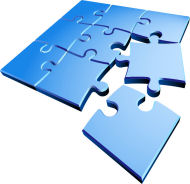
|
Bespoke Simulation Services
The creation of a bespoke business game or simulation may sometimes be an attractive option if
you are in need of something special for your organisation. Bespoke materials can be developed
that enhance your internal training courses and can be used with staff at all levels.
Strategy Dynamics accepts commissions for bespoke game development. After an
initial discussion and / or preliminary meeting we undertake a feasibility review
with clients, during which we discuss the game basis, objectives and learning
points. This would normally comprise a half-day workshop, for which a fee is charged. The
workshop normally has some substantial training outcomes in their own right as
well as ensuring that a full simulation is the right route for you.
Can bespoke simulations be value for money?
Training is expensive and so is the creation of bespoke materials but
excellent value for money can be obtained by creating materials tailored to your
needs. In addition, simulations are useful at different levels within an
organisation which increases potential reach of the training. So, for example you can use
the simulation in depth at higher management level workshops for a deep
understanding of the topic area. Then make it available for general training
for more junior staff to help ensure that there is a general understanding of
the topic. If you then look at the "cost per person", the numbers can come down
to a very reasonable level. Think about the exposure your planned training
could get in your organisation - what is the likely value of such materials at
the different levels and what does that mean in terms of a budget worth
spending?
Project Phases
- Initial contact meeting - outline requirements and timescales and
identify if the project is likely to be suitable. An introduction into our approach. At
this stage we will provide an indicative price based on the conversation, so that
you and/or your client are aware of the potential budget required for a full project.
- Feasibility study / workshop. During the workshop we
outline key underlying architectures for your business issue, identify the
scope of the model and the scale of the interface and documentation required.
We identify the major phases of development, together with an outline of the contribution
played by the different parties. Please note that games can take a long time to design,
develop and test and for the best outcome requires a good deal of input from the client.
We suggest that a minimum of 3 months is generally required for completion of even
relatively simple projects.
People involved - Client: For an effective workshop it is important that the people
present have a clear understanding of what they aim to achieve. At least one
representative should have a good understanding of the way the area under consideration
works. If the scope covers more than one business area we recommend that one representative
from each area should be involved.
People involved - Strategy Dynamics: 2 or 3 people
depending on the extent of the proposed project - a business analyst / modeller, an interface
designer / programmer and a training and documentation specialist.
Workshop outcomes:
The workshop generally acts as a stepping stone to a full simulation. Sometimes
though the conclusion is that a simulation is not an appropriate way forward,
and in these cases the modest investment in the workshop helps ensure that your
training budget is not wasted. See Case Study "Unexpected" for an example.
Report and project proposal and price for taking project to
completion.
Pricing: from £5000 + VAT and travel expenses
-
Simulation design, development and programming
Assuming that all parties agree to go forward, the phases for project
completion, included in the Feasibility Study Report and Project
proposal, will form the basis for the project plan.
NOTE:
Whilst developing a model we use client data and in order to be able to meet
project deadlines it is important that information is made available in
a clear and timely manner.
Case study 1
Unexpected insights from initial work
In the interests of equal opportunities a client company had advertised a policy
of a certain percentage representation at senior levels by women and minority
groups.
They wanted to develop a training simulation in order to explore this with HR
personnel and to raise awareness of the needs and mechanisms to help this come
about.
During the workshop the strategy for building such representation it was
identified that the policy itself was unachievable.
By developing outline architectures for the staff promotion chain the client was
able to instigate an internal strategy review to ensure a best outcome. The
architecture developed during the workshop was taken forward into that review.
Case study 2
Game kernel delivered as OCX for external front end development
In this instance we developed the underlying model as a "game kernel" that had an
interface added by an external third party. In this case they needed additional
interface features, video and audio that were more effectively added by a third party.
In addition we were also provided with permission to create a simulation using the
same model, using our own "house style" and this meant that the overall cost to our
client could be discounted as we have commercial rights for the game.
Case study 3
Whole Service - model creation, interface design, programming
and documentation
Together with a partner company, and though a program at London Business School, we
created a simulation for Roche Diagnostics for their EMEA marketing managers to
test the benefits and drawbacks of alternative launch strategies. In close
co-operation with our client a large-scale model was created and an interface and
documentation added. In this instance we were also involved in delivery ...
|

|